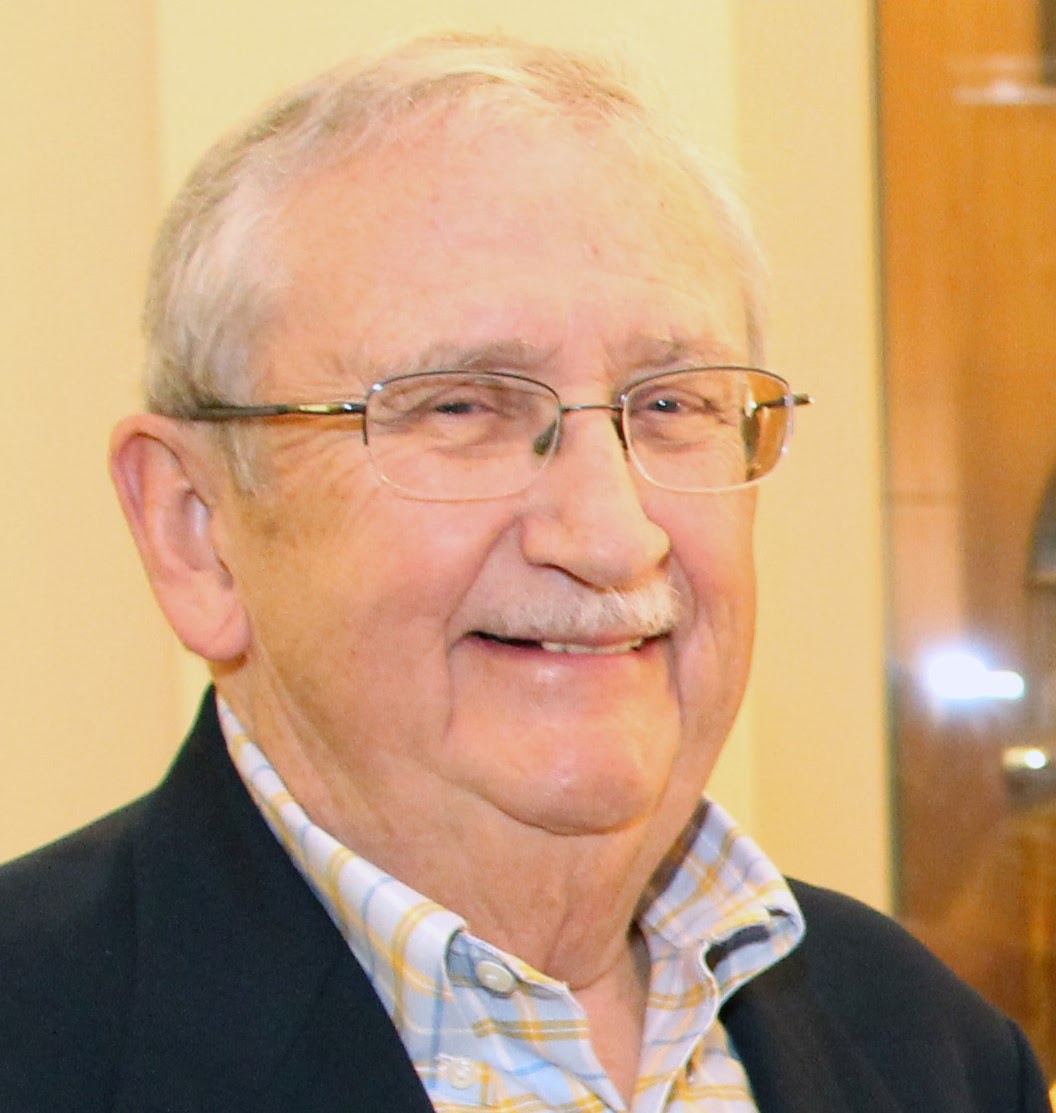Wallace B. “Wally” Eberhard

In addition to Dr. David Sachsman, a small group of outstanding journalism history scholars contributed both their academic and organizational skills to build the conference into the important event it has become today. Please join in celebrating their dedication and commitment to the Symposium.
By Erika Pribanic-Smith
Wallace B. “Wally” Eberhard was a giant in the field of journalism history whose influence spanned across multiple journals and academic organizations. Following his passing on Oct. 7, 2018, a tribute exploring his contributions to Journalism History and its home organization, AEJMC History Division, seemed fitting.
Eberhard published an article in the journal during its inaugural volume in 1974. Written when Eberhard was an assistant professor at the Henry W. Grady School of Journalism at the University of Georgia, “Sarah Porter Hillhouse: Setting the Record Straight” told the story of Georgia’s first woman editor and printer.
Although other historians dismissed Hillhouse’s Washington Monitor as dull and inconsequential, Eberhard argued that it presented “a varied news diet emphasizing public issues, with an occasional touch of levity or even sensationalism for added spice.” Eberhard skillfully connected past and present, explaining that in the early 19th century, Hillhouse showed “the kind of commitment to providing background on public affairs that marks the better newspapers today.”(1)
A friend to books
Southern journalism and sketches of individual reporters and editors clearly were among Eberhard’s interests. He reviewed a number of books for Journalism History over the decades, many of them dealing with such topics. He also reviewed several books on military and war reporting, which former Journalism History editor Mike Sweeney identified as Eberhard’s expertise. In fact, the American Journalism Historian Association named its annual award for research on media and war after Eberhard—Sweeney and his fellow former Journalism History editor Pat Washburn have received that award multiple times.
Eberhard reviewed books on an array of other topics as well, including coverage of women’s executions, fictions and frauds, and college news. Each review demonstrated Eberhard’s characteristic fairness and ability to convey constructive criticism gently, his narrative writing style, and above all, his passion for history.
In a 2006 review of David Finkelstein and Alistair McCleery’s An Introduction to Book History, Eberhard lamented that few research papers at AEJMC or AJHA explored the history of the book. However, he asserted, the book was a best friend.
The review opened with a description of Eberhard’s office, where serious volumes and “Robert Parker potboilers compete for space and attention.” Eberhard wrote that the friendship with books, “like the human variety, leads to occasional conflict, usually when shelf and floor space overflow.”(2)
Technological evolution and history
The Introduction to Book History review also noted a communication revolution expanding print into digital media that threatened the book as we know it, but Eberhard rejoiced that the book had persisted through the introduction of several new media technologies over the years.
Evolving technology concerned Eberhard as a scholar and an educator for decades. In another AEJMC-affiliated journal, Journalism Educator, Eberhard wrote in 1974 about technology and print media. He argued that AEJMC divisions (including History) should record data and assess change for the sake of historians 100 years in the future. He wrote:
Mass communication—the print media in particular—is in the midst of a technological revolution of high magnitude, and yet there is a danger we will pass through it without a full understanding of its implications or even an attempt at data gathering to make future understanding possible.(3)
Eberhard wrote prolifically for AEJMC journals, spreading his knowledge of journalism history and practice to readers of Journalism (& Mass Communication) Quarterly, Journalism Educator, and Newspaper Research Journal. Occasionally the work he published in those journals expanded the knowledge of Journalism History readers as well. For instance, a 2009 Journalism History article about news textbooks cited a 1982 article Eberhard wrote in Journalism Educator, and a 1998 Journalism History article by James Tankard—a legend in his own right—cited research Eberhard published in a 1991 issue of Newspaper Research Journal.(4)
Encouraging and inspiring fellow scholars
Washburn asserted that Eberhard also influenced fellow scholars face-to-face by encouraging them in their research endeavors. Whenever Washburn gave a conference paper, he said, Eberhard would tell him how much he enjoyed the paper and then ask questions about it that helped Washburn make his work better.
“He always did it with a smile, which made him a delight to talk to,” Washburn said. “And I know he did that with others, too, because they have told me about it.”
Most of all, Washburn said he was impressed that Eberhard continued doing historical research long after he retired.
“He was an excellent example for all of us who are retired,” Washburn said. “In other words, keep making contributions to our field as long as you can.”
Notes
(1) Wallace B. Eberhard, “Sarah Porter Hillhouse: Setting the Record Straight,” Journalism History 1, 4 (Winter 1974): 134.
(2) Wallace B. Eberhard, “Review: An Introduction to Book History,” Journalism History 32, 3 (Fall 2006): 180.
(3) Wallace B. Eberhard, “The Technological Revolution: Are Scholars Ignoring It?” Journalism Educator 29, 3 (Fall 1974): 9.
(4) Wallace B. Eberhard, “‘News Value’ Treatments Are Far from Consistent among Newswriting Texts,” Journalism Educator 37, 1 (Spring 1982): 9-11, 50, cited in Randall S. Sumpter, “Core Knowledge: Early Reporting Textbooks and the Formation of Professional Identity,” Journalism History 35, 1 (Spring 2009): 42-51; Wallace B. Eberhard, “The Press & U.S. v. Morison: Sounding the Alarm or Crying ‘Wolf’?” Newspaper Research Journal 12, 1 (Winter 1991): 64-75, cited in James W. Tankard Jr., “Samuel L. Morison and the Government Crackdown on the Leaking of Classified Information,” Journalism History 24, 1 (Spring 1998): 17-26.